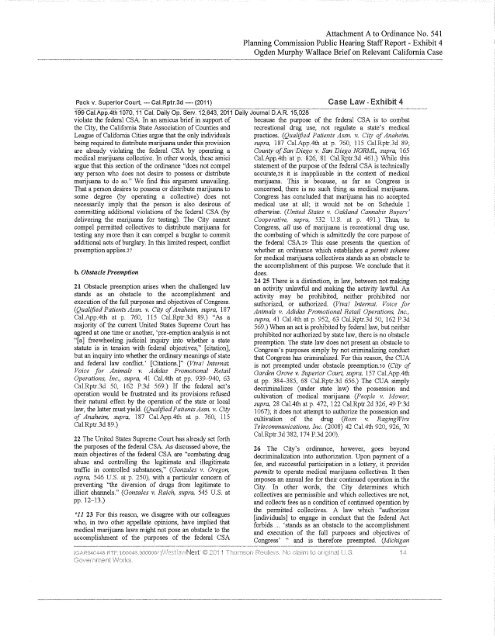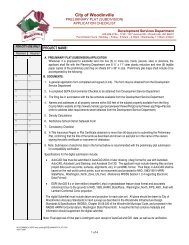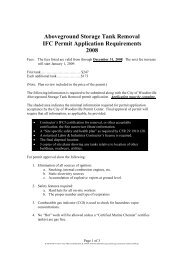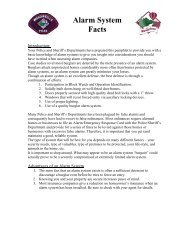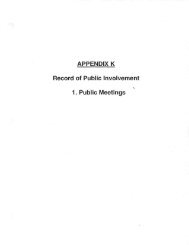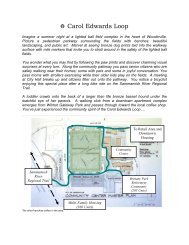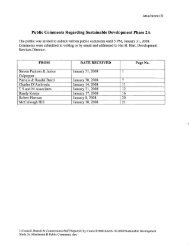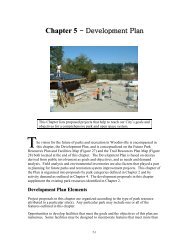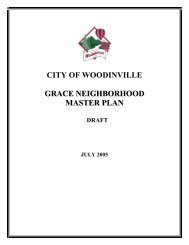Ord. 541 - City of Woodinville
Ord. 541 - City of Woodinville
Ord. 541 - City of Woodinville
- No tags were found...
Create successful ePaper yourself
Turn your PDF publications into a flip-book with our unique Google optimized e-Paper software.
Attachment A to <strong>Ord</strong>inance No. <strong>541</strong>Planning Commission Public Hearing Staff Report - Exhibit 4Ogden Murphy Wallace Brief on Relevant California CasePack v. Superior Court, --- Cal.Rptr.3d -- (2011)199 Cal.App.4th 1070, 11 Cal. Daily Op. Serv. 12,643, 2011violate the federal CSA. In an amicus brief in support <strong>of</strong>the <strong>City</strong>, the California State Association <strong>of</strong> Counties andLeague <strong>of</strong> California Cities argue that the only individualsbeing required to distribute marijuana under this provisionare already violating the federal CSA by operating amedical marijuana collective. In other words, these amiciargue that this section <strong>of</strong> the ordinance "does not compelany person who does not desire to possess or distributemarijuana to do so." We find this argument unavailing.That a person desires to possess or distribute marijuana tosome degree (by operating a collective) does notnecessarily imply that the person is also desirous <strong>of</strong>committing additional violations <strong>of</strong> the federal CSA (bydelivering the marijuana for testing). The <strong>City</strong> cannotcompel permitted collectives to distribute marijuana fortesting any more than it can compel a burglar to commitadditional acts <strong>of</strong> burglary. In this limited respect, conflictpreemption applies.27b. Obstacle Preemption21 Obstacle preemption arises when the challenged lawstands as an obstacle to the accomplishment andexecution <strong>of</strong> the full purposes and objectives <strong>of</strong> Congress.(Qualified Patients Assn. v. <strong>City</strong> <strong>of</strong> Anaheim, supra, 187Cal.App.4th at p. 760, 115 Cal..Rptr.3d 89.) "As amajority <strong>of</strong> the current United States Supreme Court hasagreed at one time or another, 'pre-emption analysis is not"[a] freewheeling judicial inquiry into whether a statestatute is in tension with federal objectives," [citation],but an inquiry into whether the ordinary meanings <strong>of</strong> stateand federal law conflict.' [Citations.]" (Viva! InternatVoice for Animals v. Adidas Promotional RetailOperations, Inc., supra, 41 Cal.4th at pp. 939-940, 63Cal.Rptr.3d 50, 162 P.3d 569.) If the federal act'soperation would be frustrated and its provisions refusedtheir natural effect by the operation <strong>of</strong> the state or locallaw, the latter must yield. (Qualified Patients Assn. v. <strong>City</strong><strong>of</strong> Anaheim, supra, 187 Cal.App.4th at p. 760, 115Cal.R.ptr.3d 89.)22 The United States Supreme Court has already set forththe purposes <strong>of</strong> the federal CSA. As discussed above, themain objectives <strong>of</strong> the federal CSA are "combating drugabuse and controlling the legitimate and illegitimatetraffic in controlled substances," (Gonzales v. Oregon,supra, 546 U.S. at p. 250), with a particular concern <strong>of</strong>preventing "the diversion <strong>of</strong> drugs from legitimate toillicit channels." (Gonzales v. Raich, supra, 545 U.S. atpp. 12-13.)'11 23 For this reason, we disagree with our colleagueswho, in two other appellate opinions, have implied thatmedical marijuana laws might not pose an obstacle to theaccomplishment <strong>of</strong> the purposes <strong>of</strong> the federal CSACase Law - Exhibit 4Daily Journal D.A.R. 15,028because the purpose <strong>of</strong> the federal CSA is to combatrecreational drug use, not regulate a state's medicalpractices. (Qualified Patients Assn. v. <strong>City</strong> <strong>of</strong> Anaheim,supra, 187 Cal.App.4th at p. 760, 115 Cal.Rptr.3d 89;County <strong>of</strong> San Diego v. San Diego NORMI, supra, 165Cal.App.4th at p. 826, 81 Cal.Rptr.3d 461.) While thisstatement <strong>of</strong> the purpose <strong>of</strong> the federal CSA is technicallyaccurate,28 it is inapplicable in the context <strong>of</strong> medicalmarijuana. This is because, as far as Congress isconcerned, there is no such thing as medical marijuana.Congress has concluded that marijuana has no acceptedmedical use at all; it would not be on Schedule Iotherwise. (United States v. Oakland Cannabis Buyers'Cooperative, .supra, 532 U.S. at p. 491.) Thus, toCongress, all use <strong>of</strong> marijuana is recreational drug use,the combating <strong>of</strong> which is admittedly the core purpose <strong>of</strong>the federal CSA.29 This case presents the question <strong>of</strong>whether an ordinance which establishes a permit schemefor medical marijuana collectives stands as an obstacle tothe accomplishment <strong>of</strong> this purpose. We conclude that itdoes.24 25 There is a distinction, in law, between not makingan activity unlawful and making the activity lawful. Anactivity may be prohibited, neither prohibited norauthorized, or authorized. (Viva! Internat. Voice forAnimals v. Adidas Promotional Retail Operations, Inc.,supra, 41 Ca1.4th at p. 952, 63 Ca1.Rptr.3d 50, 162 P.3d569.) When an act is prohibited by federal law, but neitherprohibited nor authorized by state law, there is no obstaclepreemption. The state law does not present an obstacle toCongress's purposes simply by not criminalizing conductthat Congress has criminalized. For this reason, the CUAis not preempted under obstacle preemption.3o (<strong>City</strong> <strong>of</strong>Garden Grove v. Superior Court, supra, 157 Cal.App.4that pp. 384-385, 68 Cal.Rptr.3d 656.) The CUA simplydecriminalizes (under state law) the possession andcultivation <strong>of</strong> medical marijuana (People v. Mower,supra, 28 Ca1.4th at p. 472, 122 Cal.Rptr.2d 326, 49 P,3d1067); it does not attempt to authorize the possession andcultivation <strong>of</strong> the drug (Ross v. RagingWireTelecommunications, Inc. (2008) 42 Cal.4th 920, 926, 70Cal.Rptr.3d 382, 174 P.3d 200).26 The <strong>City</strong>'s ordinance, however, goes beyonddecriminalization into authorization. Upon payment <strong>of</strong> afee, and successful participation in a lottery, it providespermits to operate medical marijuana collectives. It thenimposes an annual fee for their continued operation in the<strong>City</strong>. In other words, the <strong>City</strong> determines whichcollectives are permissible and which collectives are not,and collects fees as a condition <strong>of</strong> continued operation bythe permitted collectives. A law which "authorizes[individuals] to engage in conduct that the federal Actforbids ... 'stands as an obstacle to the accomplishmentand execution <strong>of</strong> the full purposes and objectives <strong>of</strong>Congress' " and is therefore preempted. (Michigan)( dain to Nig ro! 14


